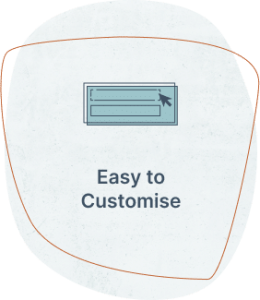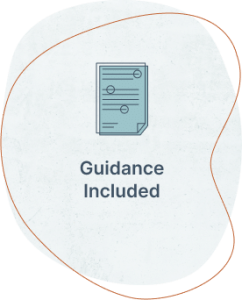Search
Affordable legal document templates written by experienced practising lawyers trusted by UK businesses and beyond
- Guidance notes included
- No hidden extras
- Easily customisable
Create your document in 3 Easy Steps
- Download
- Customise
- Share & Sign
Confidentiality agreement template
This section contains NDAs for an investment transaction. For NDAs for general commercial agreements, see general commercial NDAs. For other corporate transactions, see NDAs for a business sale and NDAs for a company sale.
Confidentiality Agreements (NDAs – Non-Disclosure Agreements) are used in a wide variety of business situations. They can be one-way, where only one party discloses information, or mutual, where both parties disclose confidential information.
why our
customers value us
I find what I need easily on the Paperrock website and I've been impressed by the comprehensive guidance. The documents consistently match the quality I have seen from in-house and external law firms in my previous roles. I'd highly recommend.
Gavin, MD | SC Transformation
Why do I need an NDA?
Confidentiality Agreements, also known as NDAs (Non-Disclosure Agreements), play an important role in various business scenarios. The essential purpose of an NDA is to protect commercially sensitive information which one party is going to disclose to another. The disclosure typically occurs as a preliminary step in a proposed business dealing or transaction between the parties.
Examples include information disclosed by:
- a company to a potential investor
- a seller to a potential buyer of shares, assets or other property owned by the seller
- by an inventor, creator or originator of a product or business idea to someone who is going to fund or exploit it
- parties considering a joint venture
Before discussing and negotiating the deal terms and the actual agreement which will cover their business transaction, one or both parties needs to receive the other’s commercially sensitive information so that the recipient can review it to help decide both whether they want to proceed with the underlying business transaction and the terms of the transaction itself.
If the parties do not proceed with transaction, the discloser of commercially sensitive information will want legal protection against the disclosure or use of the information by the recipient.
If the transaction proceeds, the long-form legal agreement for the transaction usually includes its own confidentiality provisions, replacing the NDA.
Which NDA do I use?
NDAs can be either “one way” or “two-way/mutual”. A “one way” NDA covers situations where only one party discloses confidential information, such as the seller of a property or business. A “two-way” or “mutual” NDA applies where both parties will disclose their own confidential information, as in the case of a proposed joint venture.
What does an NDA cover?
NDAs vary in complexity and length but typically address several principal issues:
- the scope of the information covered by the NDA (usually defined as “Confidential Information”)
- whether the NDA is “one way” or “mutual”
- the purpose for which the recipient can use the disclosed information
- restrictions on the recipient from disclosing or using the disclosed information other than for that specified purpose
- limited categories of people to whom the recipient may supply the information. As an example, the recipient will need to provide the information to its employees and professional advisers who need to receive it for the specified purpose
- exceptions to the restrictions on disclosure (for example, if the recipient is required to do so by law)
- duration of the confidentiality restrictions
An NDA can take the form of a relatively “short-form” agreement, including in the form of a letter. Alternatively, an NDA can be “long-form” in agreement style, which will cover the principal issues in more detail and potentially other matters.
What else do I need to know?
The parties should aim to agree on the NDA (in short or long form) relatively quicky so that they can move forward with the business relationship or transaction.
Often, however, negotiations can become protracted due to unreasonable terms in the first draft, followed by inflexible negotiation positions being taken. Issues that arise include:
- the scope of the Confidential Information – the disclosing party may draft this too wide or without including market standard exclusions
- the range of people to whom the Confidential Information can be disclosed by the recipient and also and the responsibility which the recipient has for ensuring that those people comply with the NDA. A balance needs to be struck in the wording to allow the recipient to disclose information to the people who need to receive it for the purpose of the transaction. The recipient should accept responsibility for compliance with the NDA by those people to whom it has disclosed the Confidential Information (provided the terms of this are not excessive)
- what the recipient must to do comply with a request from the disclosing party for the return or destruction of the disclosed Confidential Information. Confidential Information is almost invariably provided electronically, whether by email communications, the use of a shared drive or a specialist datasite provider. The disclosing party should be realistic about the recipient’s obligations to ensure the deletion of information which is now held on the recipient’s network or other data storage platforms
- the duration of confidentiality restrictions. There is no hard rule about this and it will depend often on the sensitivity of the information and how long it will remain commercially sensitive. A period of more than 2 or 3 years would be unusual, as would a period of less than 1 year
- the disclosing party including a contractual indemnity for breach by the recipient of the NDA
- including non-solicitation covenants as a matter of course, under which the discloser restricts the recipient from soliciting its employees and possibly also suppliers and/or clients for a period
Paper Rock’s NDA templates aim to provide a legally robust solution which also achieving a balanced position between the parties.











